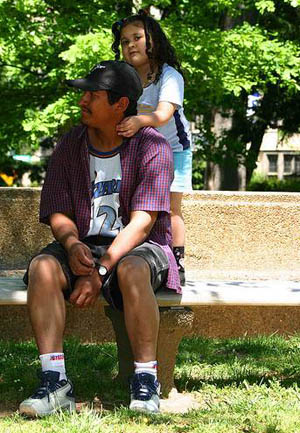 As U.S. immigration laws are currently interpreted, multiple entries by a noncitizen into this country without inspection result in permanent ineligibility for benefits through a family member. The “permanent bar” applies even if one is married to a citizen, has citizen children and has lived in this country for decades.
As U.S. immigration laws are currently interpreted, multiple entries by a noncitizen into this country without inspection result in permanent ineligibility for benefits through a family member. The “permanent bar” applies even if one is married to a citizen, has citizen children and has lived in this country for decades.
NIJC frequently encounters family who are negatively impacted by the permanent bar. Juan Carlos is a Mexican man who entered the United States without permission in 2005. Soon thereafter, he met and fell in love with Esther, a United States citizen. The couple had two United States citizen children who are now four and two years old. In 2009, Juan Carlos learned his grandmother in Mexico was gravely ill. He returned to Mexico to pay his respects before she died and then returned to the United States, again without documentation. Esther recently visited NIJC to see whether she could petition for her husband and help him gain legal immigration status. If Juan Carlos had not briefly travelled to Mexico in 2009, Esther could file a family-based immigration petition for him. He would have to go to Mexico and request a pardon for having entered the United States without a visa. But more than likely, he would be approved and permitted to return to his family in relatively short order. However, because Juan Carlos traveled to Mexico in 2009, he is considered a repeat immigration violator and he is subject to the permanent bar. Though he has a citizen spouse and children, he must remain in Mexico for a minimum of ten years before he can request a pardon to come back in. By then, his young children will be teenagers. His wife will have raised them as a single mother without the benefit of his presence and steady income. Esther sobbed as she left NIJC’s office after hearing this news.
NIJC recently challenged this reading of the law in a “friend of the court” brief in case being reheard by the Court of Appeals for the Ninth Circuit. The case, Garfias-Rodriguez v. Holder, 649 F.3d 942 (9th Cir. 2011), reh’g granted, examines whether the permanent bar is overcome by another section of the immigration law that allows visa applicants to pay a fine to avoid certain immigration penalties. NIJC’s brief offers another solution to the permanent bar; a correct reading of the law allows individuals who are subject to the permanent bar to obtain some immigration benefits if they seek a visa through an American consulate abroad as opposed to through domestic immigration channels. The language and context of the permanent bar indicate it is directed towards individuals seeking status from within the United States – not those who are abroad.
There is simply no reason for Esther, Juan Carlos and their children to have to suffer like they currently do. Under the legal interpretation offered by NIJC in its Garfias brief, Juan Carlos could obtain status through Esther. He could not obtain status from inside the United States, but he could seek a visa through an American consulate in Mexico. After presenting his case to a consular officer abroad, he could be permitted to re-enter the United States as a lawful permanent resident and rejoin his family.
The permanent bar is geared towards immigration violation recidivists. Read as NIJC suggests, it effectively prevents individuals with multiple immigration infractions from taking advantage of the United States immigration system by gaining status in the U.S. The NIJC position recognizes Congress’s intent to construct obstacles between those who disrespect immigration laws and the availability of immigration benefits, but it also reads compassion back into the statute by promoting family unity and allowing otherwise eligible immigrants to get right with the law.
Lisa Koop is a supervising attorney at Heartland Alliance's National Immigrant Justice Center.

